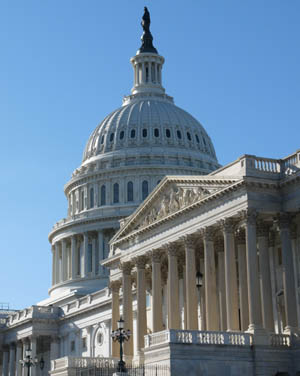
|
| Politics | Business | Schools | Justice | Health | Et Cetera |
By Leonard Sparks WASHINGTON - Maryland could receive more than $1.4 billion in Medicaid assistance under the federal economic stimulus plan wending its way through Congress, according to an analysis by the Center on Budget and Policy Priorities. An $825 billion spending and tax cut proposal being considered by the House includes provisions to temporarily raise the federal government's share of the heath care program. If passed as proposed, more than $87 billion in Medicaid assistance to states would bring Maryland about $371 million in 2009 and 2011, and $664 million in the 2010, according to the analysis released Thursday. "It's very good news for the states and very good news for the economy as well," said Jason Levitis, a policy analyst with the Washington-based center. "It's really important to get money to states so they aren't cutting health care ... and so that they aren't laying off other workers." Created to extend health care to low-income adults and children, Medicaid is jointly funded by the states and the federal government, with the federal share higher for states with lower average incomes. Under the House plan, the federal government would defer any planned increases in the share of Medicaid costs borne by each state. The plan also reduces the percentage paid by "high unemployment" states and increases the federal match for each state by 4.9 percent. States earning a "high unemployment" designation must show that their unemployment rate has increased by a specific percentage since July 1, 2006. Maryland's eligibility for the unemployment benefit is unclear. But under the plan, the state would see its federal match increase from 50 percent to 54.9 percent. Appearing on WTOP-FM radio Friday, Gov. Martin O'Malley said without federal assistance, the state could be forced to go further than the job and program cuts in the 2010 budget he unveiled Wednesday. Like a majority of states, Maryland is feeling the pinch of a dismal national economy. With more than 2 million jobs lost last year and foreclosures at a record high, states are facing severe revenue declines. O'Malley's budget includes 700 layoffs and $1.2 billion in cuts. And to close a projected $2 billion deficit caused by declining revenues, it relies on a "conservative" estimate of $350 million in forthcoming federal assistance. Without federal help, "there will be probably a higher number of job layoffs and also deeper cuts to things none of us wanted to cut," O'Malley said. Maryland's budget problems also prevent the continued expansion of Medicaid eligibility approved by state lawmakers during the 2007 special session. In July 2008, a lower income ceiling took effect, allowing more low-income families to enroll. This coming July, eligibility was supposed to be expanded to childless adults, provided that certain revenue targets were met. "We're going to have to hold where we are until we hit those benchmarks that allow us to go to the next phase," O'Malley said. Last year's expansion has brought 28,000 new enrollees to the program, said John Folkemer, deputy secretary for health care financing for the Maryland Department of Health and Mental Hygiene. "In the last little more than a week, (enrollment) grew by more than 1,000," he said. "We figured probably that first six months, you're going to see steady growth and then after that not so much." Over the last year, overall participation in the program grew from 707,000 to 760,000, Folkemer said. He described the increase as "not typical." "If the unemployment rate keeps going up, we will likely see an increase in the number of people qualifying for Medicaid," he said. Money from a federal stimulus plan could meet current needs and enable Maryland to follow through with enrolling more single adults, said Vinnie DeMarco, president of the Maryland Citizens' Health Initiative. "I think that extra money should be enough to continue our health care expansion," he said. "It would definitely be enough to cover this." |
||||||||
|
Copyright © 2009 University of Maryland Philip Merrill College of Journalism | ||||||||
| Politics | Business | Schools | Justice | Health | Et Cetera | |||
